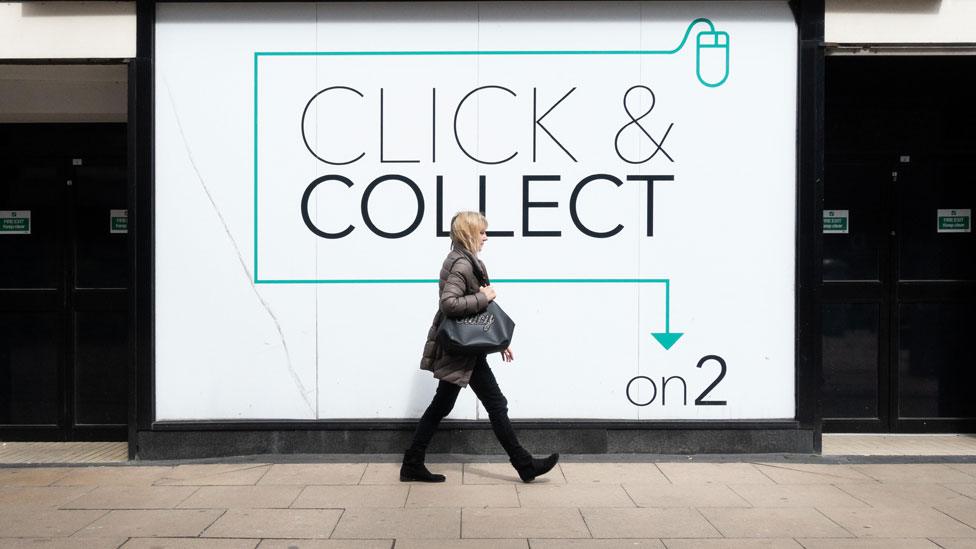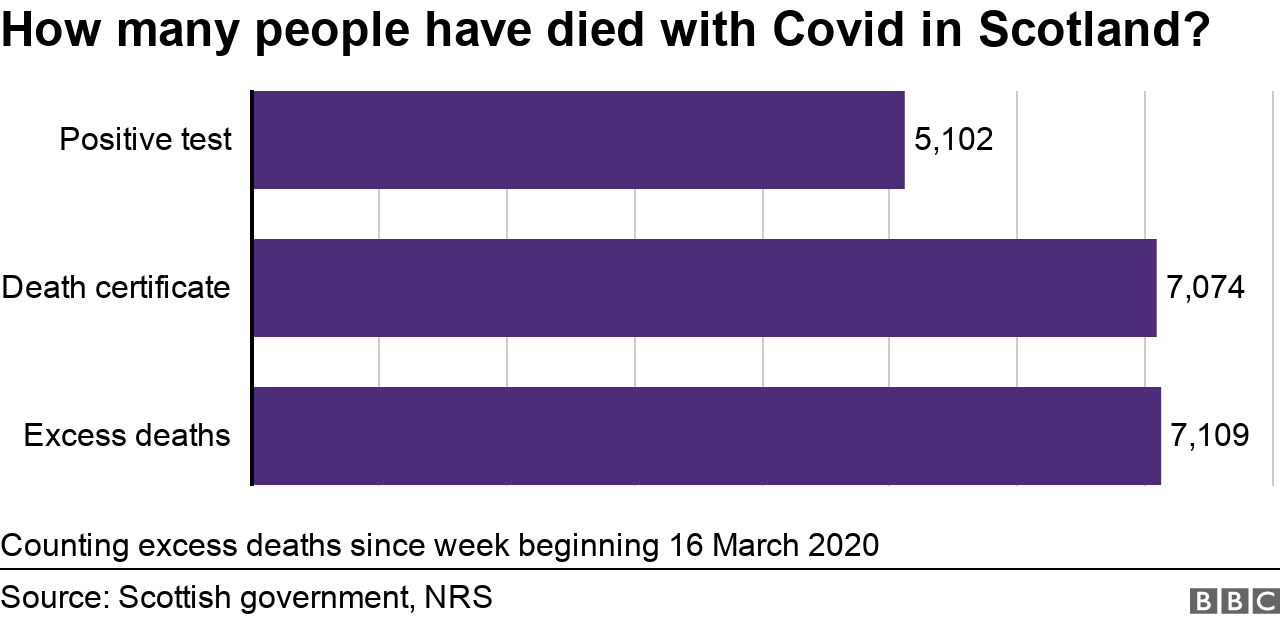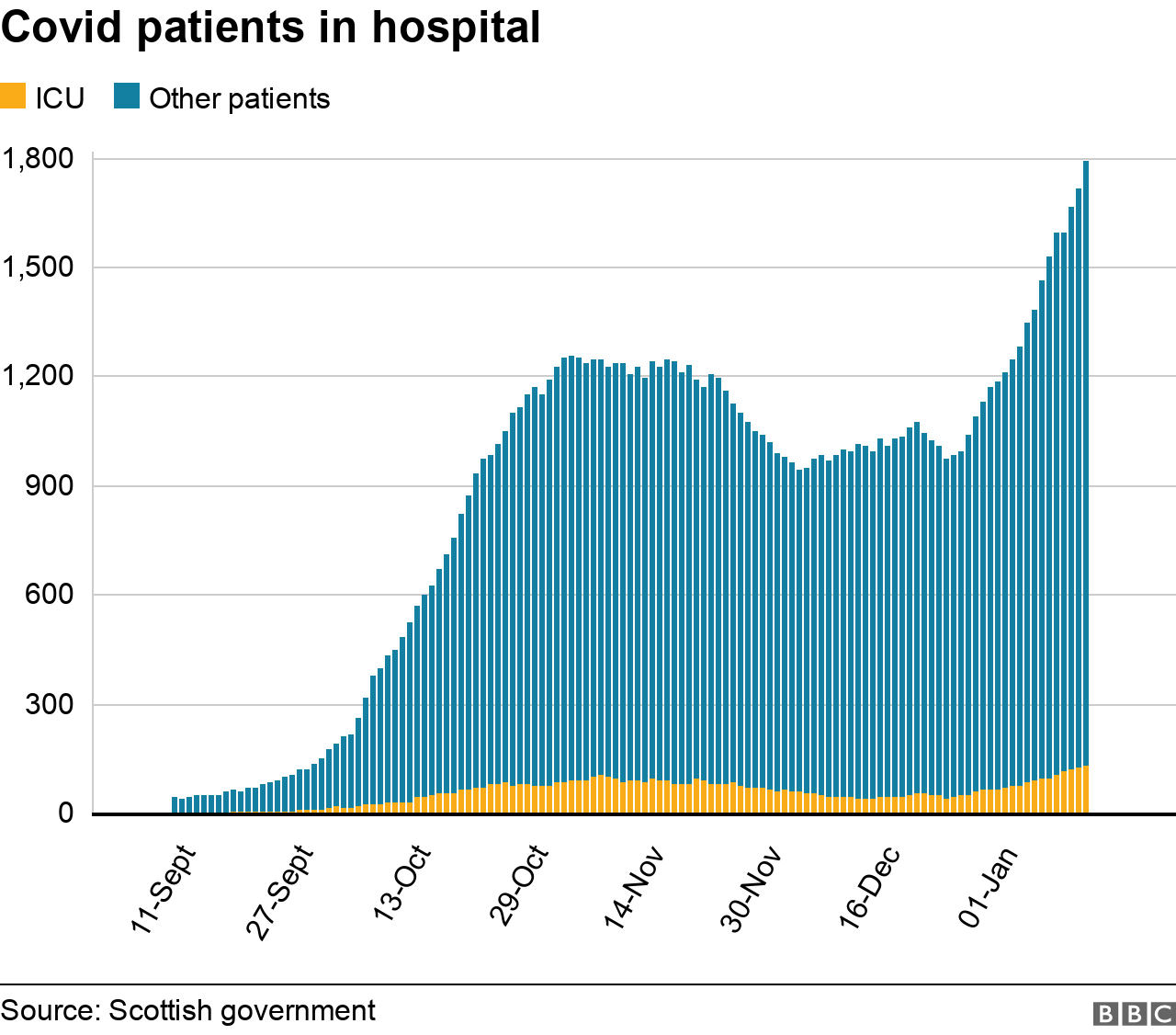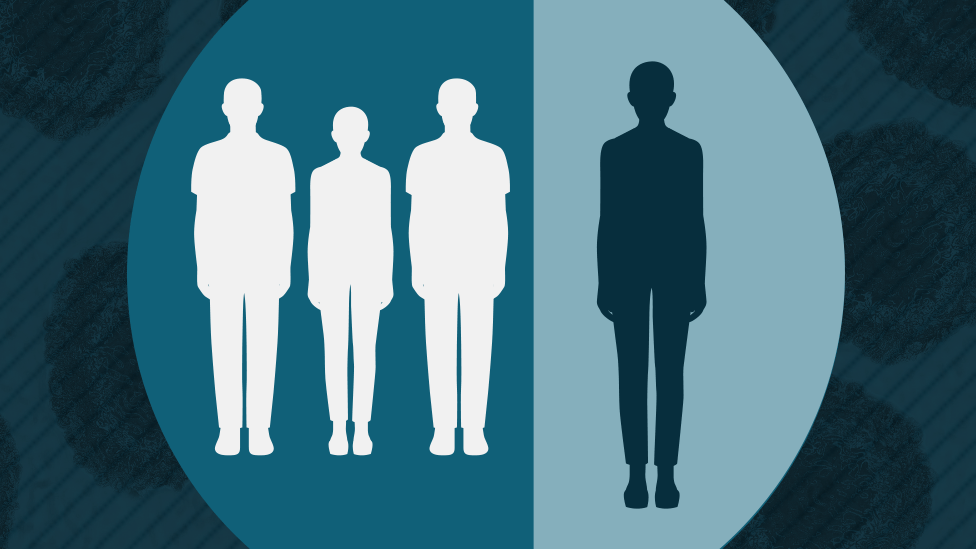Covid in Scotland: Tightening of lockdown rules announced
- Published
- comments
Covid in Scotland: Stricter retail and takeaway rules 'to cut contact'
Covid restrictions around takeaway and click and collect services in Scotland are to tighten.
Only shops selling essential items - such as clothing, footwear, baby equipment, homeware and books - will be allowed to offer click and collect.
Collections must also be outdoors, with appointments staggered to avoid queuing.
And takeaways can no longer allow customers indoors, and must instead operate from a hatch or doorway.
Retail organisations have warned that the new restrictions could be "revenue-crushing" for many businesses and would further harm already struggling retail and hospitality firms.
The changes are among six new rules that will come into force on Saturday.
They also include a ban on drinking alcohol outdoors in level four areas - which includes mainland Scotland and some islands - meaning takeaway pints cannot be consumed on the street or in places such as parks.
And statutory guidance will also be published for employers to support people working from home.
First Minister Nicola Sturgeon said that it essentially meant that if people were working from home during the lockdown last year, they must do so again this time.
Rules around work carried out in private properties will also be tightened - with only work for "maintenance, upkeep and functioning" to be allowed, rather than for example painting and decorating.
Finally, the first minister said the wording of the stay at home law will be altered to "close an apparent loophole" by preventing people from leaving home for an essential purpose and then remaining outdoors for non-essential reasons.

Click and collect services have been a lifeline for many businesses since the level four rules were imposed across Scotland on Boxing Day
Ms Sturgeon said: "We believe that both individually and collectively these additional measures, in further reducing the interactions that allow the virus to spread, will help our essential efforts to suppress it."
And she urged people to stick to the spirit, not just the letter, of the lockdown rules, saying: "Don't think in terms of the maximum interactions you can have without breaking the rules.
"Think instead about how you minimise your interactions to the bare essentials to remove as many opportunities as possible for the virus to spread.
"In everything you do, assume that the virus is there with you - that either you have it or any person you are in contact with has it - and act in a way that prevents it passing between you."


Why are the restrictions tightening?
The Scottish government is acting now because of the strain on the health service.
Its experts are warning the NHS could be overwhelmed even under a 'stay at home' scenario, external.
We've already seen two health boards postponing all non-urgent surgical procedures as an increase in Covid cases puts growing pressure on the system.
The action from NHS Lanarkshire and NHS Ayrshire and Arran is showing how the numbers of Covid patients in hospital is really starting to impact on wider care.
Wards that would usually treat people recovering from hip or knee replacements for example may need to be converted into Covid wards.
Theatres, usually busy carrying out multiple routine surgeries will become high dependency or intensive care facilities. When staff need to be redeployed to work with Covid patients, it is not safe to carry out other routine work.
These are the difficult choices many health boards will face over the coming weeks. Action required now to deal with this health emergency will have consequences later.

A further 1,949 people have tested positive for Covid-19 in the past 24 hours, representing 10.2% of the total number of people tested.
Patients in hospital with a confirmed case rose by 77 to 1,794, while 134 people are in intensive care units.
The first minister also announced that the deaths of a further 79 people who had tested positive for the virus have been recorded - bringing the total by that measure to 5,102.
But separate figures by National Records of Scotland put the total number of people to have died with confirmed or suspected cases of the virus at 7,074.
All of mainland Scotland and some islands were placed into level four restrictions on 26 December - meaning all non-essential shops had to close - with schools remaining closed to most pupils until at least the end of the month.

An evidence paper published by the Scottish government, which informed the latest restrictions, said Scotland's R number showed the virus was "likely in another growth phase" - although Ms Sturgeon said there were some signs that the lockdown was "starting to stabilise" the virus.
The paper concluded that the current pattern of case numbers meant that rising levels of infection impacting hospitals and ICU was expected. It said this could lead to the NHS being "overwhelmed" in some areas "even under a 'stay at home' scenario".

'Business survival'
Business organisation CBI Scotland said click and collect services were often a "lifeline" for struggling small businesses amid the forced closure of all non-essential shops.
And it said the government must publish "compelling" evidence to justify the tightening of restrictions.
CBI Scotland director Tracy Black said: "When well organised, click and collect services instinctively feel like a safe way for firms to keep trading.
"Of course, firms can choose to suspend click and collect if that makes sense for them, but for many others it could mean the difference between business survival or not."
The Scottish Chambers of Commerce said the new rules would "only add to the growing desperation of businesses who have put finance and time aside to make their business Covid compliant, only to have to close anyway, with no clear route back to reopening.''
There have also been concerns that limiting click and collect will merely encourage more people to go to supermarkets to shop instead."
Scottish Conservative group leader Ruth Davidson said business owners felt the evidence for the "unexpected" decisions had not been made clear, and called on the first minister to ensure sufficient financial support was put in place.


- Published13 January 2023
